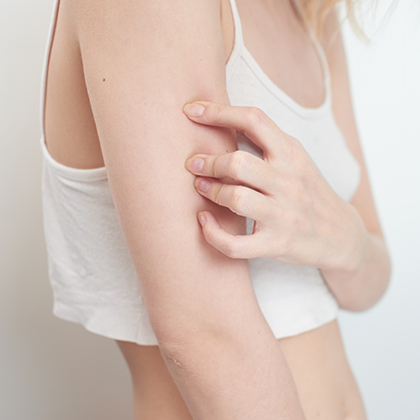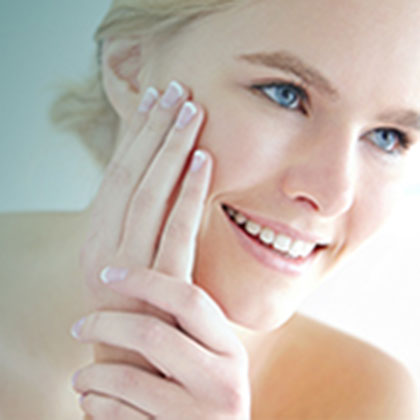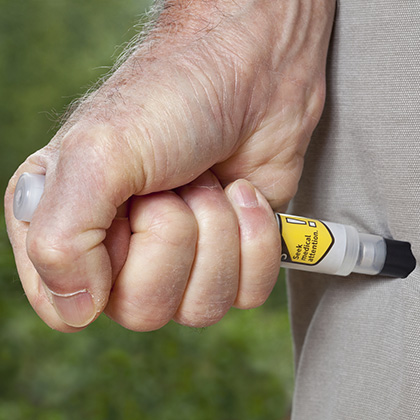Many people in the UK have dry skin, especially during the autumn and winter and also as they get older. Some, however, suffer from a specific dry skin condition called eczema.
According to the National Eczema Society, one in 12 adults and one in five children has eczema (also called dermatitis). The condition causes dry, cracked, red, sore, inflamed and itchy skin and can affect any part of the body, but particularly the hands, neck, elbows, knees, cheeks and scalp.
Besides the physical discomfort of having eczema, it can affect your emotional, social and personal wellbeing too. According to the National Eczema Association, eczema has the highest effect on disability-associated life years for people with skin diseases worldwide, and half of adults with moderate to severe eczema say their condition significantly limits their lifestyle (ii). Children and teenagers with eczema can be the target of teasing and bullying, and even adults with eczema say it affects their work.
Here are some other things you may not know about eczema:
-
The most common form of eczema is atopic eczema – this usually affects people who have other allergies such as hay fever or asthma.
-
Other types of eczema include contact dermatitis, which happens when your skin comes into contact with a particular substance such as a type of metal or latex. Seborrheic eczema is another form of the condition that’s mainly found in areas with large number of sebaceous (oil) glands, including the scalp.
-
Less common forms of eczema include discoid eczema, which causes distinct coin-shaped discs on the lower legs, trunk and forearms; varicose eczema, which is triggered by things like poor circulation and varicose veins; asteatotic eczema, a form of the condition that affects people over the age of 60; and pompholyx or dyshidrotic eczema, which is characterised by blistering of the hands and feet.
-
People who are affected by atopic eczema can have periods when they have no symptoms (or very mild symptoms), as well as flare-ups when their symptoms are worse.
-
Many people with eczema have sleep problems, since the discomfort it causes makes it difficult to get to sleep.
Living with eczema
Many things can trigger an eczema flare-up, even things like stress. Some of the most common irritants include the following:
-
Animal dander
-
Dust mites
-
Soaps and detergents
-
Cosmetics, toiletries and perfumes
-
Pollen
-
Extremes of temperature
-
Infections
-
Fabrics including wool, mohair and polyester
-
Metals (most commonly nickel)
-
Latex
-
Rubber
-
Hormonal changes
Knowing what triggers your eczema can help, especially if it’s something you can avoid. Meanwhile, there may not be any strong evidence that specific foods cause eczema or make the symptoms worse. However some people believe eating a particular food can trigger a flare-up. Here are some of the foods that may trigger eczema symptoms in some people:
-
Dairy foods, including cow’s milk
-
Eggs
-
Fish and shellfish
-
Wheat
-
Tomatoes
-
Nuts
-
Soya
-
Flavourings and additives
Preventing flare-ups
It may not always be possible to prevent a bout of eczema. But there are several self-help measures you can take to avoid a flare-up or relieve your symptoms, including the following:
Be gentle on your skin
If you have eczema, take warm rather than hot showers or baths and avoid using highly perfumed soaps (use a mild soap or body cleanser). Also try not to scrub your skin too hard, including when you dry yourself – remember to pat instead of rub. After your bath or shower, avoid using a moisturiser that includes fragrance or other irritants (for more details about suitable moisturisers, see Treating eczema, below).
Pinpoint trigger foods
If you suspect your eczema flares up or gets worse after eating certain foods, try to figure out which ones are causing the problem by keeping a diary of everything you eat. After keeping a record of your diet and when you get symptoms for a while, you should be able to spot any foods that might be causing the problem. Try avoiding these foods, but ask a nutrition expert for advice, as eliminating certain foods or food groups from your diet may leave you at risk of having nutritional deficiencies.
Wear cotton and silk
Certain types of fabrics can trigger eczema – avoid man-made ones such as acrylic and polyester as well as wool and wool-like fibres such as cashmere and mohair, all of which can make you feel itchy. Wearing tight-fitting clothes can also irritate your skin, so where possible, wear looser-fitting clothes made from natural cotton and silk, as these natural fibres help your skin to breathe and stop it from overheating. If you need to wear wool or man-made fibres for warmth during the winter, try not to wear them next to your skin (layer them on top of cotton or silk).
Use non-bio washing powder
Some people find their eczema symptoms get worse when they use biological washing powders and fabric conditions. Try using non-bio laundry products instead, or rinse your clothes well after using biological ones.
Stay active
Gentle activities may help you feel better, as exercise supports your overall health. But if you do anything too strenuous, it can make you hot and sweaty, especially during the summer – and getting hot and sweaty can irritate your skin. Also take care when swimming, as the chemicals used in swimming pools can irritate eczema-prone skin.
Be prepared for the cold
Winter can be a particularly tricky time for people who have eczema. That’s because most of us spend more of our time indoors in centrally-heated environments during the cold weather. And central heating creates a dry atmosphere, making skin even drier. Try to make sure your indoor temperature isn’t too hot by keeping your thermostat at around 21ºC, and put some moisture back into the air by using a humidifier or placing small bowls of water under your radiators at home.
Stress and your skin
Stress is a known trigger for eczema, though nobody knows exactly how the two things are linked. It may, for instance, be that stress directly contributes to the development of eczema, or that living with the condition simply makes your life more stressful.
Either way, if you have eczema and find your symptoms flare up when you’re under more stress than normal, it’s important to learn to relax and find ways of reducing stress, which may help improve your eczema symptoms.
Here are a few suggestions that may help keep stress – and eczema – at bay:
-
Smile and laugh at least once a day (it’s thought that smiles and laughter can change your brain chemistry).
-
Surround yourself with positivity. Moods are contagious, so surround yourself with people who demonstrate positive attitudes.
-
Treat yourself to something that will make you feel good: having a massage, facial or manicure, for example, could help you to manage your stress levels and promote relaxation.
-
Practice yoga and learn how to stand tall and maintain good posture – this one simple thing could help you feel calmer and more confident.
-
Write down three good things every day. Remembering the good things that happen to you may help you focus on the positive.
-
Try to get plenty of sleep, even when your symptoms try to keep you awake. Getting the right amount of sleep may help keep you alert, focused and energised.
Meanwhile, you may find deep breathing and meditation are relaxation methods that work for you. Here’s a simple exercise you can try that combines both:
-
Sit comfortably.
-
Breathe in deeply, and count one.
-
Breathe out, and count two.
-
Keep breathing in and out and counting, until you get to 10.
-
Start breathing and counting from one again, but this time breathe normally instead of deeply
-
If you lose your count, just start from one again
Keep going for anything between 5 and 20 minutes (depending on how much time you have), and aim to practice daily.
Eczema in children
Eczema is very common in children, with one in five in the UK affected (eight out of 10 children with eczema develop the condition before their fifth birthday) (iii). Both sexes are thought to be affected equally.
Atopic eczema – the most common type – is known to run in families too. According to Patient, atopic eczema is found in around eight out of 10 children whose parents both have the condition and in around six out of 10 children with one parent with eczema (iv).
Thankfully two thirds of children with atopic eczema grow out of it, though they may be left with a tendency for dry skin throughout their lives (v).
Sleep can be a particular problem, especially for younger children with eczema, as they may be in too much discomfort to even relax. Here are some tips on how parents can make things more comfortable for them:
-
Avoid overheated bedrooms, especially at night, and use cool, light bedding.
-
Wherever possible, use 100 percent cotton bedding.
-
Wash bedding frequently at high temperatures.
-
Find out whether your washing powder is causing a problem – switch to a different powder and see if it makes a difference (biological laundry products often cause symptoms in adults and children).
-
Keep your child’s fingernails short or use cotton gloves or mittens at night to stop them scratching in their sleep. To discover how to manage allergies in extreme cases, see our guide to anaphylaxis.
-
Use a special allergy-friendly vacuum cleaner, as some children’s skin may react to house dust mite droppings.
-
If your child is having a particularly hard time sleeping because of their eczema, ask their GP about wet wraps, special pyjama-like clothes that may help them have a better quality of sleep when their eczema is particularly bad.
Treating eczema
Eczema treatment is all about managing the symptoms, since there is no long-term cure.
The most commonly-used treatment for mild eczema is moisturising products called emollients. Using liberal amounts of emollients to help maintain your skin's moisture levels can really help relieve sore, itchy skin, especially during the colder months when the air inside and outside is dryer than during the summer.
These are available over the counter and on prescription in various formulations, including lotions, creams, ointments and sprays, as well as products that you put in the bath. They work by reducing the amount of moisture lost from your skin, and are most effective when your eczema is under control (that is, they keep your skin from losing too much moisture when it is relatively healthy).
If your eczema is flaring up you can also use a mild steroid cream, which you can also get over the counter (stronger steroid creams are available on prescription). These work by suppressing your body's inflammatory response. If you use a steroid cream, it’s important to follow the instructions on the label carefully, as applying it too thickly or for too long a period could damage your skin.
You may also want to consider taking an over-the-counter antihistamine tablet if your skin feels really itchy. And if your eczema is stopping you from getting a good night’s sleep, there are some types of antihistamines that may help by making you feel more drowsy.
In more severe cases of eczema, doctors can prescribe steroid tablets or antibiotics when the skin becomes infected.
Natural skin support
Many nutritional experts believe fish oil supplements may help those who have psoriasis, as the omega-3 fatty acids found in fish oils may help relieve inflammation, dryness and itching. According to one study, one of the main omega-3 fatty acids found in fish oil – namely DHA (docosahexaenoic acid) – may have a beneficial impact on the outcome of atopic eczema (vi).
Another study, meanwhile, suggests there may be some benefit in eating oily fish or taking fish oil supplements during pregnancy, since there’s evidence this may reduce the development of eczema during the first year of a baby’s life (vii).
If, however, you’re a vegetarian or vegan you can still benefit from an omega-3 supplement, thanks to the availability of products that contain the natural triglyceride (TG) form of omega-3. This is sourced from plant organisms called microalgae rather than fish.
Taking a high-strength multivitamin and mineral formula may also be beneficial, as it may support your overall health and immune system. Formulas that contain vitamin C may help with itching, for instance – as vitamin C is a natural antihistamine – while zinc and vitamin E may help to strengthen the immune system.
Treating your eczema on a daily basis may be difficult, but these steps should help get you on the right track. If you’d like more information on a range of common health conditions, our health library is a good place to start.
References:
-
Available online: http://www.eczema.org/what-is-eczema
-
Available online: https://nationaleczema.org/research/eczema-facts/
-
Available online: https://www.nhsinform.scot/illnesses-and-conditions/injuries/skin-injuries/skin-rashes-in-children
-
Available online: https://www.nhsinform.scot/illnesses-and-conditions/injuries/skin-injuries/skin-rashes-in-children
-
Available online: https://uichildrens.org/health-library/common-questions-about-eczema
-
Koch. C, Dolle. S, et al.Docosahexaenoic acid (DHA) supplementation in atopic eczema: a randomized, double-blind, controlled trial. Br J Dermatol. 2008 Apr;158(4):786-92.
-
Miles. EA., Calder PC., Can Early Omega-3 Fatty Acid Exposure Reduce Risk of Childhood Allergic Disease? Nutrients. 2017 Jul 21;9(7). Pii:E784.
Related Posts
Disclaimer: The information presented by Nature's Best is for informational purposes only. It is based on scientific studies (human, animal, or in vitro), clinical experience, or traditional usage as cited in each article. The results reported may not necessarily occur in all individuals. Self-treatment is not recommended for life-threatening conditions that require medical treatment under a doctor's care. For many of the conditions discussed, treatment with prescription or over the counter medication is also available. Consult your doctor, practitioner, and/or pharmacist for any health problem and before using any supplements or before making any changes in prescribed medications.

Christine
Christine Morgan has been a freelance health and wellbeing journalist for almost 20 years, having written for numerous publications including the Daily Mirror, S Magazine, Top Sante, Healthy, Woman & Home, Zest, Allergy, Healthy Times and Pregnancy & Birth; she has also edited several titles such as Women’ Health, Shine’s Real Health & Beauty and All About Health.
View More



